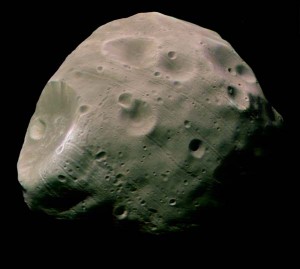Phobos Up Close
Given all the angst recently about NASA astronauts needing a new destination, it’s good to step back and review the options. There aren’t many. There’s the moon, of course, and Mars. A near-Earth asteroid. And one more possibility, often forgotten—the Martian moons Phobos and Deimos.Tomorrow at 3:5…

Given all the angst recently about NASA astronauts needing a new destination, it's good to step back and review the options. There aren't many. There's the moon, of course, and Mars. A near-Earth asteroid. And one more possibility, often forgotten—the Martian moons Phobos and Deimos.
Tomorrow at 3:55 p.m. Eastern time, Europe's Mars Express spacecraft will make the nearest pass ever of Phobos, coming within 67 kilometers (41 miles) of its surface, close enough for scientists to learn about the moon's gravity (and density) from the way the spacecraft's radio signal is distorted during the swingby.
People have been thinking about human missions to Phobos for more than 30 years. The first proposal I remember hearing about, in the early 1980s, was from Fred Singer, better known today as a climate change skeptic. He called his mission "Ph-D," for Phobos-Deimos.
Since then, most ideas have focused on robotic probes, including the Russian Phobos-Grunt mission currently targeted for a launch in 2011/2012. But the notion of a human mission to Phobos has never gone away, and even got a plug in last year's Augustine report on the future of human space exploration:
A Phobos-based teleoperated exploration of the Martian surface, returning with samples from that surface, would likely precede a crewed Mars landing mission, and would provide dramatically more responsive remote control than with the communication delays incurred between Mars and Earth. The use of Phobos- and/or Mars-produced in situ propellant could likely reduce the flight cost of a crewed Mars landing expedition by a factor of two to three.A human Phobos mission has a lot of appeal. It's far easier than a Mars landing, it would force us to solve the problems of long-term living in space, and it's not much of a stretch from a near-Earth asteroid mission. To those who say it would be unsatisfying, and that it's foolish to think about traveling all the way to Mars without landing there, I have just two words: Apollo 8.